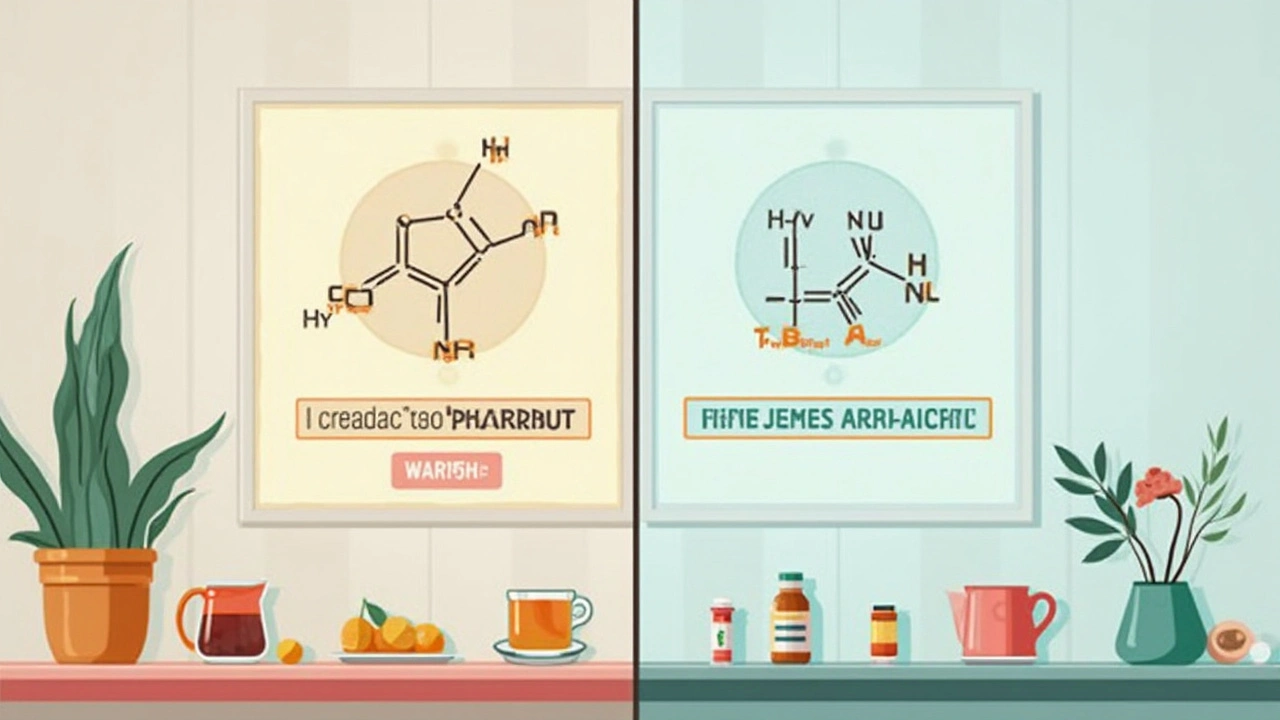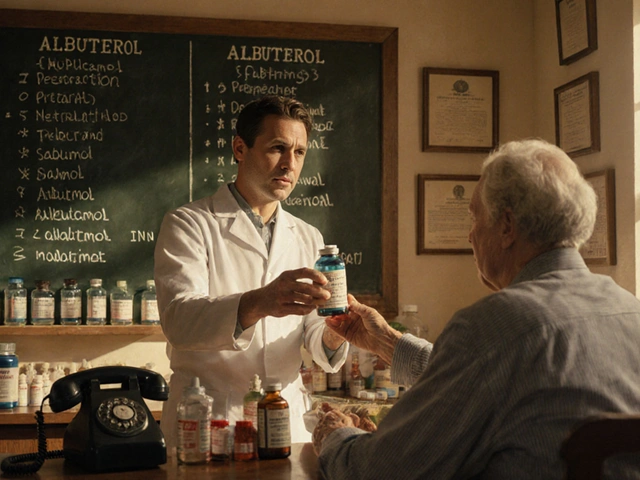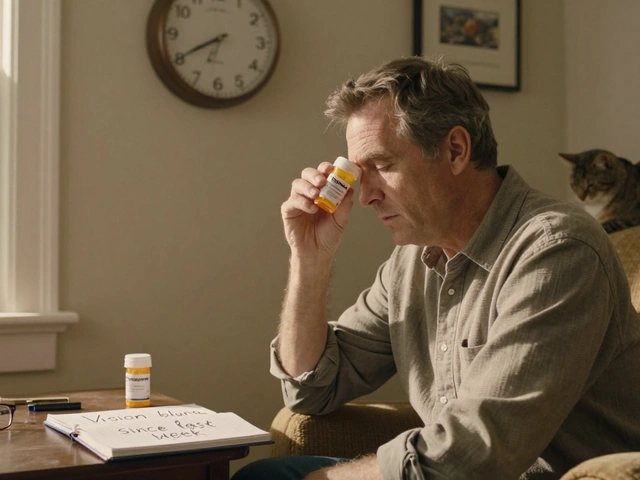Picture this: it's a normal evening, and after a spicy curry or a greasy takeaway, you feel that familiar burn creep up your chest. Zantac used to be the go-to fix. For years, pharmacies stocked shelves high with packets of those little tablets. People barely thought twice about grabbing Zantac for some quick relief—until the day the headlines screamed about cancer risks, recalls, and lawsuits. Suddenly, a medicine trusted for generations became a source of anxiety no heartburn pill could touch. What's the real story behind Zantac? How did it tumble from household staple to health scare? The answers are tangled up in science, regulatory drama, and the very relatable annoyance of acid reflux.
The Rise and Fall of Zantac
Zantac, known by its generic name ranitidine, came on the scene back in the early 1980s. Doctors and pharmacists cheered it on as a game-changer for people who couldn't bear another night with gnawing acid reflux or chronic heartburn. By blocking histamine receptors in the stomach, it helped reduce acid production—offering relief, protection from ulcers, and even helping with some allergic reactions. Zantac was soon everywhere: prescribed in hospitals, picked up over the counter, and stashed in kitchen cupboards across Britain and beyond. Glaxo (later GlaxoSmithKline) raked in billions of pounds, and ranitidine became a top-selling medication worldwide for decades.
Fast forward to 2019, and all that changed in a flash. American pharmacies and regulatory agencies, led by the FDA, announced they had found something deeply worrying in Zantac and its generics: NDMA, or N-nitrosodimethylamine. This isn't some minor impurity. NDMA is a known carcinogen, which means it’s tied directly to the risk of cancer in humans. And it wasn’t just a trace. Some samples showed NDMA at levels hundreds of times higher than the recommended safe limit—especially when the product was kept in hot climates or stored for a long time.
The response was rapid: shelves cleared, prescriptions halted, recalls cascading across dozens of countries—including the UK’s own Medicines and Healthcare products Regulatory Agency (MHRA) pulling stock in 2019. Lawsuits started flying in the US, with thousands of people claiming that long-term Zantac use led to cancer diagnoses, particularly of the bladder, stomach, and colon. Meanwhile, scientists scrambled to answer a key question: Was the NDMA contamination a result of the way the drug was made, or did ranitidine itself break down into NDMA inside the body or while sitting on a pharmacy shelf? Studies hinted it could be both—heating and time seemed to boost the NDMA spike, and early evidence suggested ranitidine could react in the body to create NDMA, especially in the acidic environment of the stomach.
The shock was real. People who’d happily chewed Zantac for years were suddenly madly Googling, worrying about every ache and twinge, and hunting for substitutes. And while the chance of developing cancer from using Zantac for short periods appears low, the presence of a carcinogen in a supposedly safe product rocked public faith in pharmacy shelves. It also threw up an awkward reality: sometimes drugs can go from gold-standard to blacklisted almost overnight.

What the Science Really Says About Zantac and NDMA
Let’s get into the nitty-gritty because the world of drug safety is messy, and it’s worth knowing what experts have actually found. NDMA, the contaminant in question, isn’t just an obscure chemical. It can crop up in smoked meats, some water supplies, and, at much lower levels, other heartburn remedies. But the link between NDMA and cancer is solid. Animal studies have shown NDMA can cause a range of cancers, and health authorities—including the World Health Organization—rank it as a probable human carcinogen. The fear wasn’t plucked from thin air.
The peculiar twist with Zantac? The NDMA problem didn't come from dirty factories, but from something baked into ranitidine’s own chemistry. When scientists mixed ranitidine with nitrite (common in stomachs from processed food) in lab tests, NDMA formed. Give it heat—like sitting in a van on a sunny day—or let it sit for months in storage, and the levels climbed even more. In 2020 and 2021, several independent labs (including studies from Stanford and Valisure, a pharmacy testing company) confirmed the same pattern: NDMA levels increased over time or with heat exposure, which happens more than you’d think in the supply chain. The World Health Organization and the European Medicines Agency both recommended yanking all ranitidine products for safety, given the uncertainty.
But here’s the sticky bit—epidemiological studies, meaning research looking at actual people who took ranitidine, haven’t clearly proven that it causes cancer at the doses people typically took. A massive Danish study combed through years of prescription records and cancer registries, and didn't find an obvious spike in cancer among users. Still, the problem with rare cancers or small increased risks is that it can take decades (and thousands of cases) for the pattern to show. So regulators pulled the medicine based on the potential risk, not proof of widespread harm—a classic case of better safe than sorry.
If you’re the type who pops a pill only rarely, or grabbed Zantac just a couple of times, it doesn't mean you’re doomed. The NHS and US FDA both put out clear statements: occasional or short-term use isn’t something to panic about. The longer someone used ranitidine, the higher the theoretical risk, but experts haven’t called for routine cancer screening for everyone who once took it. If you’re still anxious, though, mention it to your doctor, especially if you took it for years or have other cancer risk factors (like being over 50, smoking, or a family history).
Why didn’t this get picked up sooner? NDMA isn’t a standard thing drugmakers looked for back in the 1980s. Modern analytical chemistry—the sort that can sniff out a few nanograms per tablet—has come a long way since then. The first hints of trouble didn’t really surface until 2018, when another heart medicine, valsartan, got yanked for a different NDMA contamination scare. Once scientists realized the risk, the race was on to test other meds. Zantac’s unique chemical structure was just unlucky—a ticking time bomb set off by routine manufacturing, hot warehouses, and time.

What You Can Do: Safe Alternatives and Taking Charge of Heartburn
If the Zantac recall left you staring blankly at the pharmacy shelves, you're not alone. Nearly everyone who dealt with reflux or heartburn had to rethink their go-to cures. Luckily, there are plenty of options that don’t carry the same NDMA concerns. The family of drugs Zantac belonged to, called H2 blockers, has a few other members. Famotidine (sold as Pepcid) quickly became a favourite replacement, as it doesn’t seem to break down into NDMA under the same conditions. Cimetidine is another option; though, like any med, it can have side effects and can mess with certain other prescriptions. If you’re looking for something different, proton pump inhibitors (PPIs)—think omeprazole or lansoprazole—are wildly effective, shutting down acid production further up the pipeline, though they come with their own precautions if used long term.
But not every heartburn fix needs a trip to the chemist or a new prescription. Loads of lifestyle tweaks actually work, and you’d be shocked at how small changes can make a difference. Try eating smaller meals and skipping the lying down right after. Cut back on booze and cigarettes—yes, the usual suspects. If your jeans are a bit snug after lockdown, losing some weight can do wonders, since belly fat squeezes the stomach and pushes up acid. Even just lifting the head of your bed with a couple of sturdy bricks reduces those 2 a.m. acid attacks. Dairy triggers heartburn for plenty of people, and so does spearmint or peppermint tea, so notice what foods set you off. A food and symptom diary for a week works wonders. And let's be honest: as fun as a midnight snack is, late-night eating makes things so much worse.
If your heartburn is regular and persistent, don’t tough it out. Reflux that won’t quit could point to something more serious than dodgy takeaways, like Barrett’s oesophagus or even early oesophageal cancer. NHS advice is pretty clear—if you’ve got heartburn most days for three weeks or more, or if you’re coughing up blood or losing weight for no reason, see your GP. Ignoring symptoms because you’re nervous isn’t worth it.
Wondering how to get rid of those old Zantac tablets lurking in the medicine cabinet? Don’t flush or toss them in the bin—it’s a pollution risk. Take them to your local pharmacy for safe disposal; they’ll sort it, no questions asked. And if you spotted some generics that look suspiciously similar, double check the labeling. Since the recall, almost all ranitidine products in the UK have been pulled, but some old stocks can still turn up in out-of-the-way places or old travel bags.
The whole Zantac saga is a pointed reminder that medicine safety is never 100%. Even big-name brands can fall afoul of hidden risks, and sometimes, safer options arrive long after the first blockbuster drug. If you’re worried about what drugs are lurking in your kitchen drawer, you can always use the NHS Yellow Card scheme to flag any side effects and keep an eye on recalls. And if you’ve ended up here because you’ve spent the last decade chewing Zantac before every curry night, don’t let the headlines ruin your sleep as well as your digestion. Stay smart, switch to safe alternatives, and know you’re not alone in your heartburn battles.






Comments
Crystle Imrie
7/Jun/2025Wow, the Zantac saga still feels like a blockbuster disaster movie, but honestly it’s just hype.
Shelby Rock
7/Jun/2025Risk perception is a cultural mirror, and we often magnify tiny dangers into existential dread. The whole Zantac drama shows how a single chemical can become a symbol for distrust in pharma. People forget that NDMA also shows up in smoked bacon, yet we keep eating it. It’s weird how we defiantly ignore the mundane but panic over a pill that’s been around for decades. So maybe the real lesson is to keep a balanced view, not to let fear hijack reason.
Dhananjay Sampath
7/Jun/2025For anyone looking for a safe switch, famotidine (Pepcid) works well, and it doesn’t produce NDMA under normal storage conditions, so consider that as a first‑line alternative; also, cimetidine is an option if you’re not on interacting meds, but watch out for potential drug‑drug effects, and remember that PPIs like omeprazole are effective for chronic reflux, though they have their own long‑term considerations, so discuss with your doctor before making a change, and keep a diary of symptoms to track improvement.
kunal ember
7/Jun/2025The chemistry behind NDMA formation is surprisingly intricate. Ranitidine contains a dimethylamino group that can react with nitrite ions, especially in acidic environments like the stomach. Laboratory studies have reproduced this reaction by mixing ranitidine with sodium nitrite, generating measurable NDMA. Heat accelerates the reaction; tablets stored at 40 °C for several weeks showed NDMA levels many times the FDA limit. Moreover, the degradation pathway involves a nitrosation step facilitated by trace metal catalysts that may be present in manufacturing equipment. This means both the manufacturing process and post‑manufacture storage conditions contribute to the impurity profile. As a result, regulatory agencies opted for a precautionary withdrawal rather than waiting for definitive epidemiological proof. The case underscores how modern analytical techniques can uncover risks that were invisible decades ago.
Kelly Aparecida Bhering da Silva
7/Jun/2025It's no coincidence that the big pharma giants love to keep a tight grip on the market while quietly lobbying against strict testing; we’ve seen similar patterns with vaccines and other “essential” drugs. The Zantac recall feels like a staged distraction to shift attention away from the countless other suppressed side‑effects. If you ask me, the whole thing is a massive cover‑up orchestrated by multinational corporations scared of losing profit margins, and the media conveniently spins it as a consumer‑safety victory while the real agenda stays hidden.
Michelle Dela Merced
7/Jun/2025Can't believe I’ve been popping Zantac for years 😱💊! Thanks for the heads‑up, now I’m switching to Pepcid 🚀.
Alex Iosa
7/Jun/2025It is incumbent upon both regulators and consumers to act responsibly when scientific data suggest a plausible carcinogenic risk. While definitive causation has not been established, the precautionary principle justifies the withdrawal of a medication that may pose a threat to public health. The responsible course of action includes transparent communication, thorough investigation, and offering safe, evidence‑based alternatives. Moreover, individuals who have taken ranitidine should be informed about potential risks without inducing unnecessary alarm, and medical professionals must remain vigilant for any emerging epidemiological trends.
melissa hird
7/Jun/2025Thank you ever so much for this exhaustive exposition, dear scientists; I’m sure the world will now sleep peacefully, knowing that every little tablet has been scrutinized with the utmost rigor and that we can all continue our daily routines without a single worry about the dreaded carcinogens lurking in our medicine cabinets.
Mark Conner
7/Jun/2025Honestly, this whole saga just proves why we need to support American-made meds that follow stricter standards than overseas junk. If you want safe heartburn relief, buy from a reputable US pharmacy and stay away from the foreign knockoffs.
Charu Gupta
7/Jun/2025It is imperative to note that the presence of NDMA in ranitidine tablets violates established safety thresholds, thereby necessitating immediate withdrawal. Physicians should advise patients accordingly, and pharmacies must ensure proper disposal. 🧪📦
Abraham Gayah
7/Jun/2025Wow, another "expert" tells us to panic over a pill that was on shelves for decades. Guess we’re supposed to trust the FDA only when they feel like it.
rajendra kanoujiya
7/Jun/2025Not really convinced that the whole thing is a massive conspiracy; sometimes chemicals just behave oddly, no hidden agenda needed.
Caley Ross
7/Jun/2025From an observational standpoint, the recall highlights how supply‑chain logistics-temperature control, shelf life, and packaging-play a crucial role in drug safety, something that often goes unnoticed by the general public.
Bobby Hartono
7/Jun/2025Let me start by saying that I completely understand the anxiety that many people feel after reading about the Zantac recall, and I want to assure you that there are practical steps we can all take to alleviate those concerns.
First, it is essential to verify whether you still have any ranitidine tablets in your home; if you do, the safest course of action is to return them to a pharmacy for proper disposal rather than keeping them in a drawer.
Second, consider switching to an alternative medication such as famotidine or a proton pump inhibitor, both of which have been shown to be effective for heartburn without the NDMA issue.
Third, keep a symptom journal; noting what foods, times of day, and stress levels correlate with your reflux can help you and your healthcare provider tailor a non‑pharmacological approach.
Fourth, lifestyle adjustments like elevating the head of your bed, avoiding late‑night meals, and reducing alcohol and caffeine intake are proven to reduce acid reflux episodes.
Fifth, stay informed through reputable sources such as the FDA or NHS sites rather than sensationalist headlines, because accurate information empowers better decisions.
Sixth, if you have been using ranitidine for many years, discuss a screening plan with your doctor; while routine cancer screening isn’t universally recommended, a personalized assessment is prudent.
Seventh, remember that the risk of NDMA formation is dose‑ and time‑dependent, meaning short‑term or occasional use poses minimal danger.
Eighth, the broader lesson here is that drug safety is an evolving field, and staying engaged with your health care team is the best safeguard against future surprises.
Ninth, share your experience with friends or family who may still have old Zantac; helping them dispose of it safely can prevent accidental exposure.
Tenth, recognize that while the media may highlight worst‑case scenarios, the majority of patients will not experience adverse outcomes.
Eleventh, maintain a balanced perspective: anxiety can exacerbate reflux symptoms, so keeping calm is in itself therapeutic.
Twelfth, if you ever feel uncertain about a medication, never hesitate to ask your pharmacist for a detailed explanation.
Thirteenth, ultimately, the goal is to manage your heartburn effectively while minimizing any potential risks, and there are plenty of proven strategies to achieve that.
Fourteenth, thank you for reading this extensive guide; I hope it offers clarity and peace of mind.
Fifteenth, stay healthy, stay informed, and keep supporting each other in navigating these health challenges.
George Frengos
7/Jun/2025Stay optimistic! Transitioning to a safer heartburn solution can be a positive step toward better overall wellness. Your healthcare provider can help you find the right regimen, and you’ll likely notice improvement in sleep quality and daily comfort.
Jonathan S
7/Jun/2025From an ethical standpoint, the Zantac controversy underscores the moral responsibility of pharmaceutical corporations to prioritize patient safety above profits, and it is imperative that regulatory bodies enforce stringent testing protocols to prevent similar incidents; moreover, healthcare professionals must remain vigilant and transparent when communicating risks, ensuring that patients are empowered to make informed decisions without undue fear, and lastly, the community should advocate for stronger oversight to safeguard public health 🛡️.
Charles Markley
7/Jun/2025Integrating pharmaco‑kinetic modeling with real‑world evidence pipelines can elucidate the stochastic variance in NDMA flux across heterogeneous supply chains, thereby augmenting risk‑adjusted therapeutic indices and fostering a paradigm shift toward predictive safety analytics in the post‑regulatory landscape.
L Taylor
7/Jun/2025Interesting point, thanks for sharing
Matt Thomas
7/Jun/2025Just a note: “recall” is singular, not “recalls”. Please double‑check your grammar.
Nancy Chen
7/Jun/2025The Zantac uproar feels like a kaleidoscopic carnival of fear, intrigue, and corporate shadow‑games, painting the pharmaceutical world in neon‑lit shades of distrust while offering a glittering reminder that even the most mundane tablet can become a Pandora’s box of speculation and caution.